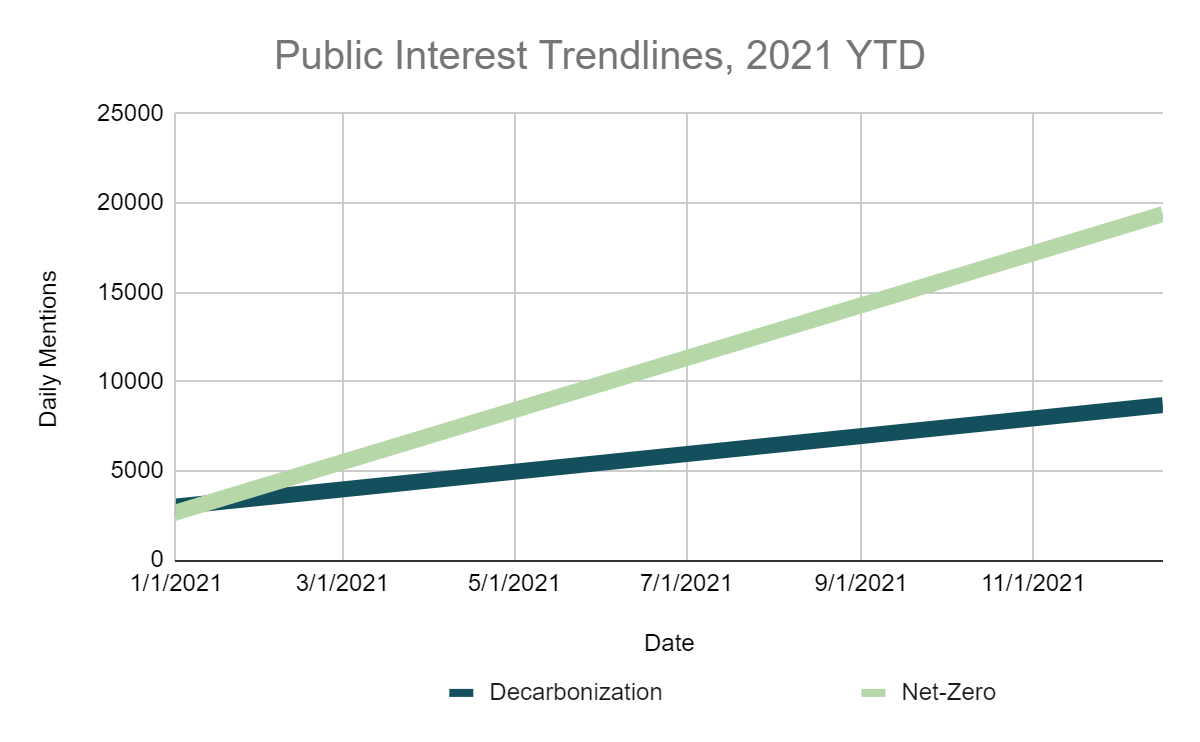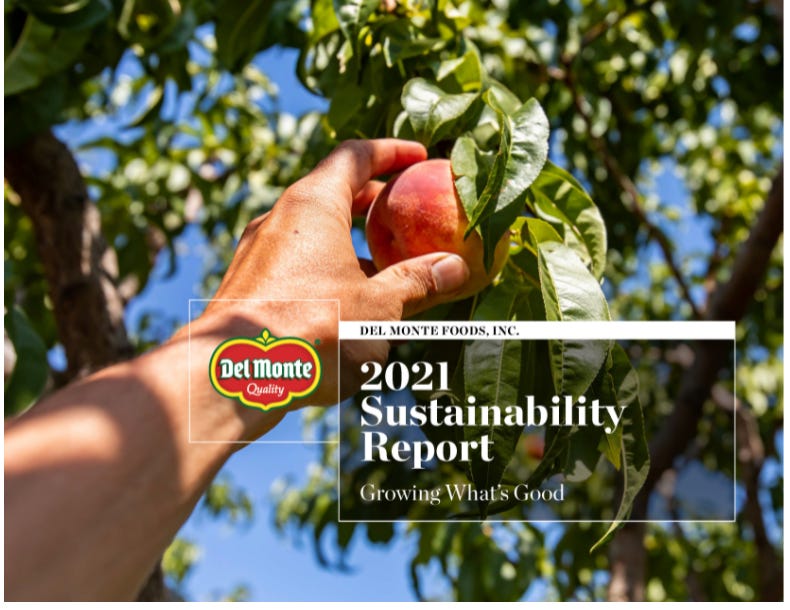Being Intentional
The bi-weekly newsletter from Motive, covering ESG and Sustainability. In this edition: 2021 wrap-up, net-zero vs. decarbonization, Del Monte Foods, and Sustainability Mission Statements.
Welcome to the final edition of the Being Intentional newsletter for 2021. As we head into the final stretch of the year we wanted to take a moment and reflect on what 2021 has meant to all of us within the sustainability community. It’s exceptionally easy to get overwhelmed by negative news or fall into a trap of believing that we’re not making a difference. Now is a great time to take a step back and look at all the great things that have happened over the past year.
With our focus on helping companies make better, more informed sustainability decisions, there are two metrics that really jump out when we look at 2021: 1) the number of entities (largely corporations) that have made commitments to a net-zero future, and 2) the rise of executive-level sustainability professionals within companies.
2021 was a banner year on both fronts. With regard to net-zero, 2021 saw a 231% increase in commitments over 2020. While it’s important to understand that committing to net-zero is not the same as achieving net-zero (we discuss this in greater detail later in the newsletter), it is a sign that companies are waking up to the fact that they have a huge part to play in making the world a better place.
This fact is further illustrated by the 228% increase in Chief Sustainability Officer roles within companies. That increase makes the CSO role the fastest growing executive role within the Fortune 500. Furthermore, this figure only takes into account roles with that specific title. When you factor in the overall growth within corporate sustainability programs and teams, it becomes clear that sustainability is here to stay.
We fully expect 2022 to continue where 2021 left off and see companies pushing even harder into sustainability than ever before, either because of financial pressure, government regulation, or consumer demand. Winners and losers are going to be increasingly determined by those that make sustainability part of their business strategy and those that do not.
So here’s to a wonderful New Year. We are grateful for your time and support.
What We Are Seeing
The 2021 word of the year in corporate sustainability must surely be ‘net-zero’...but before companies double down on their net-zero statements, we should point out that the word of 2022 is likely to be ‘decarbonization’. (OK, it may be a bit early to declare the 2022 word of the year).
What does this all mean for corporate sustainability teams heading into 2022?
At the beginning of 2021, public interest in net-zero and decarbonization were remarkably similar, as measured by the volume of news and social media mentions, with decarbonization just edging ahead of net-zero. As net-zero plans emerged and were promoted, interest in this approach took off, as seen in the trendline below. Public interest in decarbonization grew along with interest in net-zero, but not as dramatically.
As net-zero came to prominence, the first cohort of companies to release commitments were celebrated for their ambitious leadership and the second cohort celebrated for their commitment to collective action, and then by this time COP26 was coming round and net-zero statements started flowing like water.
So much was made of net-zero by the business and finance community at COP26 that its sheen started to dull and suspicions started to grow. Now net-zero is widely perceived as the baseline expectation of corporate climate plans by many stakeholders…or simple greenwashing by many others.
Net-zero was born as a strategy to minimize the amount of carbon and other greenhouse gases externalized into the atmosphere. The idea was companies would seek to reduce their emissions and thereafter offset any emissions they could not reduce so that there would be no net increase in the absolute levels of carbon and greenhouse gases in the atmosphere.
Since gaining such widespread traction, however, many have criticized net-zero plans for placing too much focus on offsets (often dependent on unproven technologies) and not enough on emissions reductions in the first place. For many, net-zero has become a fancy accounting trick to allow business-as-usual, and in this sense, actual decarbonization is preferred to net-zero.
Public interest in net-zero was certainly fueled by the COP26 gathering where we were all informed months ahead of the event itself that net-zero would feature prominently. So what do we see post-COP26?
Public interest in net-zero persists, although growing more slowly than before. But, and most interestingly, public interest in decarbonization begins to accelerate, growing much faster than interest in net-zero and likely soon to match and eventually surpass the latter.
Heading into 2022, it is important for corporate sustainability teams to take note of these trends--Net-zero plans extending over 20 or 30 years are significant commitments shaping stakeholder expectations, so best to get it right!
What we are seeing is that net-zero on its own is not going to do much heavy lifting for you. Net-zero plans are still generally well-received by consumers and investors, however there is a growing focus on what these plans actually entail. The balance of emissions reductions vs. offsets will be critical to success, with the public increasingly favoring the former.
If you already have a net-zero plan, then it may be time to reflect on how it is balanced and how it can be most effectively communicated. If you don’t already have a net-zero plan then maybe don’t rush into one--a decarbonization plan may be a better route for you to explore. Net-Zero emerged out of an interest in managing carbon emissions, but now it seems this interest has moved from managing emissions to eliminating emissions.
Decarbonization is the emergent theme to center on. The trend in public interest since the completion of COP26, which ended mid-November, is limited in time so far, but this is a development, among many others, we are keeping a close eye on.
Business of Sustainability
The ESG Mirage (Link)
Last week brought about the release of a significant piece of investigative journalism in the ESG world. The piece, appearing in Bloomberg Businessweek and titled “The ESG Mirage”, was proclaimed (or maybe promoted?) as a ‘bombshell’ article sure to rock the industry. And if it is going to rock the industry, then this is something we all need to take seriously as ESG and corporate sustainability programs now walk hand-in-hand (even if at times begrudgingly).
We encourage everyone to read the original article. It provides an excellent overview of the debates and challenges in the ESG field from the past 10+ years and serves as a great opportunity for us to remind everyone that investing in companies with ‘good’ ESG scores is not necessarily the same as investing in companies working toward sustainability.
But… it is not a bombshell.
In brief, MSCI is one of the world’s largest ESG rating agencies which not only provides ESG data and ratings to investors and asset managers but also constructs indices to which countless ETFs and related investment products are indexed. In this sense, MSCI is arguably the most formative player in the ESG ratings field right now--active investors are using their data and passive investors are shadowing their data (with possibly 60% of the money flowing into ESG space linked to MSCI data in some way, as explored in the original article).
The big reveal in the Bloomberg Businessweek piece is that the MSCI methodology does not in fact correlate corporate activity to impacts on people and the planet, as many people newly interested in sustainable or impact investing had assumed, but rather it correlates environmental, social, and governance risks to corporate bottom lines. MSCI data and ratings are not about the impacts of companies on the world, as the article expertly demonstrates, but rather about the impacts of world affairs on company profitability…and so investing in companies with ‘good’ ESG scores is not necessarily the same as investing in companies working toward sustainability.
This big reveal is only a reveal if you’ve jumped into sustainable or impact investing without reading much about sustainable or impact investing. MSCI--and all other major ESG rating agencies (including Bloomberg)--operate from a position of measuring the risk exposure of environmental, social, and governance developments to company profitability. If an issue is not material to a company’s bottom line then it does not rate. Even if a company has a material impact on an issue but this issue is not material to the company’s bottom line, then it still does not rate. ESG materiality has always been a one-way street. Read the methodologies of any of the data providers and this is abundantly clear.
What the Bloomberg Businessweek article does get right is that MSCI has been pushing the limit on their marketing materials to the point that someone who was not going to read the rating methodology or perform any meaningful due diligence would likely (and inaccurately) assume that MSCI ESG scores were a reflection of sustainability. Contrary to much reactionary social media commentary, the piece does not highlight any flaws or errors in the MSCI process or products, but it does certainly make the case that MSCI is guilty of greenwashing in their marketing.
ESG was never about sustainability. It has always been about incorporating more information into decision-making processes. These processes could certainly be geared toward advancing sustainability but they do not inherently need to be either. ESG is data, what you use this data to accomplish is up to you.
Recent interest in ESG, from the retail investor level in particular, has muddied the waters and conflated ESG with sustainability, impact, and social responsibility …and marketing departments have been far too eager to take advantage of these oversights, misunderstandings, and impulses. The data is sound, but the marketing departments are nefarious.
We do not expect much to change as a result of this piece for three principal reasons. First, institutional investors and asset managers are the most important client sector for MSCI data and ratings and these clients were fully aware of the MSCI methodology (and those of all other major ESG rating agencies). This was not news to them.
Second, most people who were shocked at this news were people who were passively investing in ‘sustainable’, ‘impact’, or ‘green’ ETFs which were benchmarked against MSCI indices. But that they were shocked suggests they hadn’t read the full prospectus nor the methodology supporting the ETFs they were opting into. They wanted a quick, easy, and cheap entry to impact investing and now discovered that there is nothing quick, easy, or cheap about true impact investing. So maybe a few people adjust their portfolios and seek more active alternatives, but nowhere near the exodus required for these ETFs to fall.
Third, retail investors leaving passive MSCI-indexed ETFs in search of true impact investing options would serve as a great signal to the fledgling ESG sub-industry which is actually providing data about how companies impact people and the planet. MSCI may not provide such data, but there are a few start-ups that do. Growing investor demand for such data would be the signal this sub-sector needs to be able to break free from the sidelines and grow into a more mainstream offering alongside traditional inward-focused ESG data providers. When this happens, it will be additional to existing ESG data providers and bolster the entire industry rather than replace the likes of MSCI.
We think this is important to note because investigative journalism that would ‘rock the ESG industry’ and pull the rug out from under MSCI--arguably one of the most important actors in the space now--would be critical to all corporate sustainability officers and ESG leaders. Most, if not all, public companies shape their sustainability and ESG programs and reporting to the practices of the ESG rating industry. A revolution in the rating industry would catalyze a revolution in corporate sustainability programs.
This particular piece is an excellent primer on many of the debates and challenges within the ESG industry but it is not the spark of change some may have hoped.
CSR Spotlight: Del Monte Foods, Inc.
Sustainability Reports | Del Monte Foods, Inc. (Link)
Every day is another opportunity to read newly released CSR reports, and this week we read one that really stood out. It wasn't just one of the better ones over the last couple of weeks, but it is one of the best we have read all year.
Not only is Del Monte Foods, Inc. one of the largest U.S. producers and distributors of branded food products widely recognized for their canned fruits and vegetables (anybody up for a side of French-style green beans?), but it is also one of the most active in addressing their impacts on people and the planet. There will always be impacts associated with large-scale food production (in fact, with all scales of food production), but the Del Monte Foods 2021 Sustainability Report is demonstrating how a company can show accountability in these impacts.
What We Like:
A Clear Materiality Assessment: The sustainability report doesn’t only build upon a materiality assessment but actually opens with a materiality assessment. From the beginning, we know what Del Monte is focused on improving, why, and how. Opening with such a clear materiality assessment and discussion sets the framework for evaluating everything else in the report. Rather than stick it away in an appendix, or refer to it as a separate document, the 2021 Sustainability Report is shaped around the materiality assessment--this provides much context which is often lacking in many other sustainability reports.
Objectives and Metrics: All discussions are developed in the format of presenting an objective and providing data discussing if/how the objective was achieved. It couldn’t be more clear.
Reporting frameworks: The 2021 Sustainability Report is prepared in line with SASB and GRI reporting frameworks. Del Monte Foods, Inc. goes even one step further and provides a SASB and GRI data index within the report directing readers to relevant sections of the report or additional documentation and disclosures.
What We Would Like:
More of this! This is one of the best Sustainability Reports we have read this year. There is always room for discussion on the rate of improvement of certain metrics, or the inclusion of others, but these are simply subjective considerations. From considerations of process and reporting, Del Monte Foods, Inc. is a clear leader that we hope more companies, from the food and agriculture sectors and beyond, will emulate.
What We Are Saying
Your Sustainability Mission Statement is Not Helping (Blog Link)
Nearly every company has a sustainability mission statement today…but these are not nearly as helpful as many companies think. Sustainability mission statements actually meant something in the 1990s and early 2000s when sustainability was beginning to trend, but the times--and markets--have changed. The same statements that were once celebrated are now failing you. The question is no longer if you believe in sustainability but rather what are you doing about sustainability. It is time to progress from sustainability mission statements to materiality statements, and these will establish the framework by which your efforts are evaluated. Do not miss the opportunity to control your own narrative.




